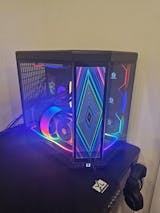The importance and usefulness of different parts of computer hardware is a topic of heated controversy. A common example of a component that is often the subject of investigation is the CPU cooler. Some people think it's a waste of money to buy an aftermarket CPU cooler, especially if you don't overclock or use your computer rarely. This claim, however, fails to take into account a number of important details that show how important a decent CPU cooling is.
Efficient Heat Dissipation:
Every computer system's central processor unit (CPU) is its beating heart. While running, CPUs produce heat, and too much heat can harm or severely reduce performance. Manufacturers of CPUs usually supply stock coolers that can manage the heat that is produced under ordinary working settings. Nevertheless, it might be challenging for them to keep at the ideal temperature when working hard or when the outside temperature is excessive.
Aftermarket CPU coolers, on the other hand, offer superior heat dissipation capabilities. These coolers are available in a wide range of designs, from air to liquid cooling systems, and may be customized to match specific performance needs. Aftermarket coolers aid in temperature stability by drawing heat away from the CPU, which in turn ensures constant performance and increases the processor's lifespan.
Noise Reduction:
When the CPU is working hard, the stock cooling makes an unbearable racket. Some standard coolers have tiny, high-speed fans that make a lot of noise, which isn't great for users who want a peaceful place to work on their computers.
The bigger fans used by aftermarket CPU coolers typically include sophisticated noise-reduction mechanisms. Since loud fan assemblies are not needed with liquid cooling methods, the operation is nearly silent. Aftermarket coolers make computers more comfortable to use, particularly for people who value silence, by lowering noise levels.
Overclocking Potential:
Overclocking may not be necessary for average users, but performance is paramount for gamers and enthusiasts who always strive to push their gear to its maximum. Overclocking causes the central processing unit (CPU) to operate at rates greater than its factory settings, which in turn causes it to produce more heat.
Overclocking causes the system to run unstablely or experience thermal throttling since stock coolers aren't designed to manage the extra heat. By providing more thermal headroom, aftermarket CPU coolers made for overclocking enable customers to run their CPUs at higher frequencies without experiencing temperature spikes.
Long-Term Investment:
When shopping for a new computer, some people might think that buying an aftermarket CPU cooler is a waste of money. A high-quality CPU cooler, on the other hand, is an investment in the system's longevity and efficiency.
A high-quality CPU cooler will maintain its cooling effectiveness regardless of the hardware setup, meaning it will endure through several CPU upgrade cycles. In addition, you may rest easy knowing that many aftermarket coolers have long warranties that cover any problems that may arise.
To sum up, at first glance aftermarket CPU coolers could seem like a waste of money, but upon closer inspection, their advantages become clear. An aftermarket cooler is an investment in your computer's performance and lifespan; it reduces noise, efficiently dissipates heat, and unlocks overclocking potential. Purchasing a high-quality CPU cooler is an investment that will provide benefits over time, regardless of whether you are an enthusiast, professional, or casual user.















